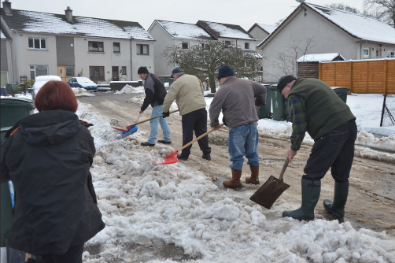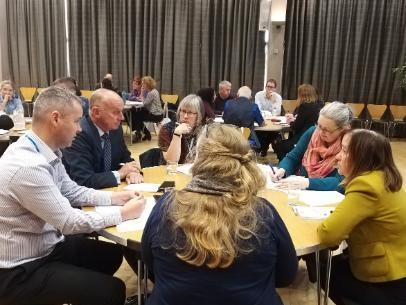How the NCR is helping Scotland to build back better
Published: 1 December 2020
A look at the importance of recovery after emergency events and the work the National Centre for Resilience is doing to help in this area.
Ailsa Mackay, NCR Centre Manager
When communities are faced with natural hazard events such as heavy snow, landslide or severe flooding, it is essential for emergency organisations to have planned, trained and be prepared to respond effectively to minimise the impact and then to be on hand to aid recovery.

The organisations that deliver this emergency support, in the UK, are categorised within the Civil Contingency act as;
- Emergency responders
- Third Sector organisations
- Charities
- And individual community groups
Each of these organisations delivers support using a structure of 5 key critical, time phased, activities forming the core framework for all emergency planning, response and recovery in the UK:
- Assessment
- Preparation
- Prevention
- Response
- Recovery
The four categories that focus on planning and responding to extreme events have naturally taken precedence for practitioners to ensure swift support in times of crisis. However, by taking this action it has left practitioners reporting to the National Centre for Resilience’s (NCR) partner the Scottish Resilience Development Service (ScoRDS) that they feel under prepared to robustly deliver recovery support to those that need it, when they need it.
Recovery from extreme natural hazard events is critically important due to the complex far reaching impacts to those affected. It comes at a specific time after the phases of response and can be effectively supported by practical activities to build long term community resilience. Sadly there can never be a return to what was, what happened can never be undone, so individuals and communities will only ever return to a new form of normal. In order for that new normal to be more resilient a better approach, solution or mitigation must be found in order to prevent the initial issue from happening again or at the very least limit its effects.
We cannot fail to take the learnings from events at home or abroad
Evidence from international emergency situations has proven that we simply cannot build back to what we had. It has repeatedly shown that we must build back in a way to prevent the initial issue from reoccurring. It also tells us that we cannot fail to take these learnings because once we’ve built back to the same thing, it’s simply too late.
For resilience practitioners who are already too busy planning for and responding to emergency situations there are difficulties for them in both delivering recovery support and in adopting the concept of using an evidence based approach to make the transformational change that is needed to build our communities back better. Furthermore, human nature leans towards returning to the status quo after a significant disruptive event and in a crisis, anxiety and stress can create a knee jerk reaction to simply return to was, making it difficult for people to adopt this concept.

Thus in our 2019 national workshops we invited practitioners to discuss the challenges they currently face in delivering the necessary recovery support to communities. They reported practical difficulties under the broad headings of:
- Communications
- Terminology
- Resources
- Governance
- Training
Since then, the initial lessons learned, gathered throughout the COVID-19 crisis, suggest that these challenges have been amplified by the pandemic (ScoRDS 2020). Therefore, we must make sure that we thoroughly understand the barriers that prevent practitioners from effectively supporting recovery and address them with evidence taken from home and abroad. This way we can find the most robust solutions or mitigations to help our communities build back better. Therefore, adopting the concept of and using an evidence based approach is essential.
The NCR is now carrying out a programme of Academic Symposiums. These symposiums are bringing together senior academics with Scottish Government to explore how we all might collaborate and support resilience professionals, helping them address their challenges with practical tools and knowledge.

First published: 1 December 2020
<< Blog

